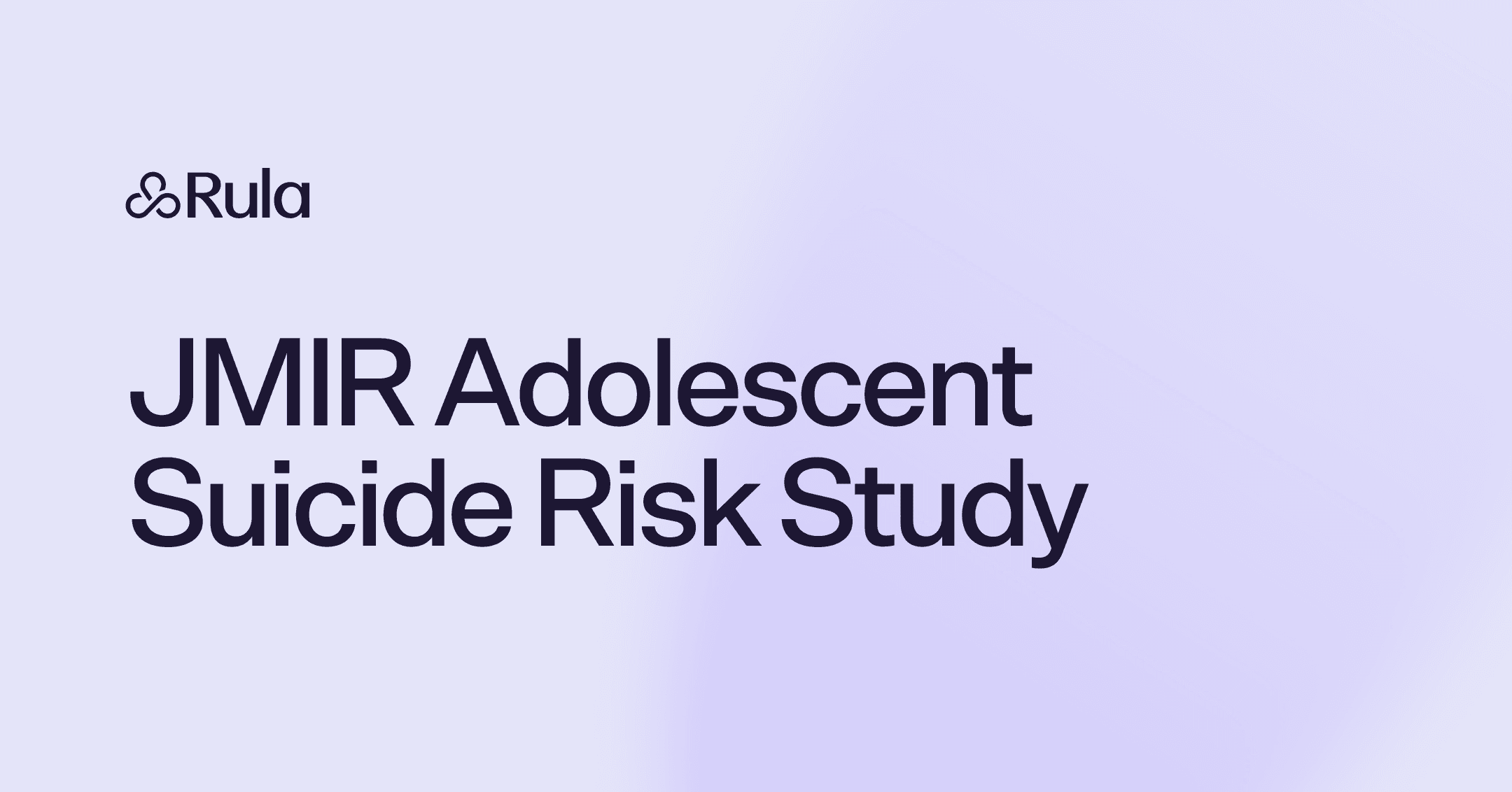New research from Rula shows that virtual therapy can effectively reduce depression and anxiety symptoms in teens — including those at elevated risk of suicide.*
Teens at elevated suicide risk showed faster improvement in symptoms and reached similar levels of wellbeing as their lower-risk peers by 12 sessions.
Virtual mental healthcare removes common barriers to treatment, offering personalized provider matching, regular symptom tracking, and 24/7 crisis support when teens need it most.
Teen mental health is in crisis. Suicide is now the second leading cause of death among adolescents, and rates have climbed 62% from 2007 to 2021. Even more concerning, one in five high school students has seriously considered suicide, and more than one in ten have attempted it.
But there's hope. New research published in JMIR Pediatrics and Parenting shows that virtual mental healthcare can provide effective, accessible care for teens experiencing suicidal thoughts — including those at the highest risk.
*The 988 Suicide and Crisis Lifeline provides 24/7, confidential support with trained crisis counselors. If you or a loved one is in emotional distress or a suicidal crisis, please call or text 988. If experiencing a life-threatening emergency or you need immediate help, please call 911.
Understanding the study: Real-world care for high-risk teens
This groundbreaking study examined real-world data from more than 6,200 adolescents (ages 12-17) who received virtual mental healthcare through Rula. What makes this research particularly important is that it included a significant number of teens at elevated suicide risk — a population often excluded from research due to safety concerns.
The study divided participants into two groups:
No suicide risk group: 3,533 adolescents with no signs of suicidal thoughts or behaviors
Elevated suicide risk group: 2,712 adolescents who screened positive for suicidal ideation or behaviors
All teens received virtual therapy and/or psychiatric services and completed standardized assessments before each session to track their progress. Researchers followed their symptom changes across the first 12 visits.
The care you need, when you need it
Learn how Rula can support your mental health journey
What the research revealed
The findings were encouraging across the board, but especially for teens at elevated suicide risk.
All teens showed meaningful improvement
Both groups experienced significant reductions in depression and anxiety symptoms over 12 sessions. These improvements weren't just statistically significant — they were clinically meaningful, meeting or exceeding established thresholds for what patients themselves would consider a noticeable difference.
High-risk teens improved faster
Perhaps the most striking finding: teens with elevated suicide risk showed greater rates of improvement than their peers without suicide risk. Their depression and anxiety symptoms decreased more quickly, and by the 12th visit, they reached symptom levels similar to teens who hadn't been at risk.
This matters because it shows that with the right support, teens experiencing suicidal thoughts can experience rapid relief and meaningful progress.
Who sought care for suicide risk?
The study also revealed important patterns about which teens were most likely to be at elevated suicide risk when starting care:
More female adolescents: Girls were more represented in the high-risk group, which aligns with national data showing higher rates of suicidal ideation among adolescent girls.
Younger teens: Surprisingly, younger adolescents (ages 12-14) made up a larger portion of the elevated risk group, reflecting emerging concerns about rising suicide rates among preteens.
More complex mental health needs: Teens at elevated risk had higher rates of depression diagnoses, co-occurring mental health conditions, and were more likely to need psychiatric medication management.
Why virtual therapy works for high-risk teens
Several factors may explain why Rula's virtual mental healthcare model was effective for teens at suicide risk:
Regular symptom monitoring: Rula uses measurement-based care, meaning teens complete standardized questionnaires repeatedly throughout their care. This allows providers to track changes in real-time and adjust treatment as needed — particularly important for catching warning signs early.
Personalized provider matching: Teens (and their families) can choose providers based on factors like specialty, background, and availability. Research shows that feeling connected to your provider is one of the most important factors in treatment success.
Accessibility: Virtual care removes common barriers like transportation, long wait times, and geographic limitations. For teens in crisis, being able to access care quickly can be life-saving.
Built-in safety protocols: Rula's platform includes 24/7 crisis support and a dedicated clinical risk team that guides providers in managing elevated suicide risk, ensuring teens get appropriate care when they need it most.
What this means for families
If you're a parent or caregiver worried about your teen's mental health, this research offers several important takeaways:
Don't wait to seek help
Two-thirds of teens who die by suicide had no contact with mental health services in the month before their death. If you're concerned about your teen, trust your instincts and seek professional support. Early intervention can make all the difference.
Virtual therapy is a valid option
This study adds to growing evidence that virtual therapy is just as effective as in-person care for adolescents with depression and anxiety — including those experiencing suicidal thoughts. If traditional in-person therapy hasn't been accessible or feasible for your family, online options like Rula can provide quality care.
Improvement can happen quickly
While every teen's journey is different, this research shows that meaningful symptom reduction can occur relatively quickly with consistent care. Many teens at elevated suicide risk showed significant improvement within their first 12 sessions.
The right support matters
Finding a provider your teen feels comfortable with makes a difference. Rula's matching system helps families connect with licensed providers who specialize in adolescent mental health and who accept their insurance, making it easier to find the right fit.
Getting started with mental health support for your teen
If your teen is living with with depression, anxiety, or suicidal thoughts, here are some steps you can take:
Talk to your teen: Create a safe, non-judgmental space for them to share how they're feeling. Let them know you're there to support them, not punish them.
Consider professional help: A licensed therapist or psychiatrist can provide evidence-based treatment and create a personalized care plan for your teen.
Explore your options: With Rula, you can find a provider who specializes in teen mental health, accepts your insurance, and has availability as soon as tomorrow.
Know the warning signs: Changes in mood, sleep, or appetite; withdrawal from friends and activities; giving away possessions; or talking about death or suicide are all signs that immediate help may be needed.
Have a crisis plan: If your teen is in immediate danger, call 988 (the Suicide and Crisis Lifeline) or go to your nearest emergency room. Rula also provides 24/7 crisis support for patients.
A message of hope
Teen suicide is a serious and growing concern, but it's also preventable. This research demonstrates that accessible, personalized mental healthcare can make a real difference — even for teens at the highest risk.
Virtual therapy platforms like Rula are helping to bridge the gap between the millions of teens who need mental health support and the care that's available to them. By making it easier to find the right provider, track progress, and get help when it's needed most, we're creating new pathways to healing for young people in crisis.
If you're concerned about your teen's mental health, you don't have to navigate this alone. Help is available, and with the right support, teens can recover and thrive.
Learn how Rula can support your teen’s mental health journey
Rula makes it easier to find a licensed therapist or psychiatric provider who accepts your insurance so you don't have to choose between affordable care and excellent care. With a diverse network of more than 21,000 providers, 24/7 crisis support, and appointments available as soon as tomorrow, we're here to help your teen make progress — wherever they are on their mental health journey.
Rula’s editorial process
Rula’s editorial team is on a mission to make science-backed mental health insights accessible and practical for every person seeking to better understand or improve mental wellness.
Members of Rula’s clinical leadership team and other expert providers contribute to all published content, offering guidance on themes and insights based on their firsthand experience in the field. Every piece of content is thoroughly reviewed by a clinician before publishing.





